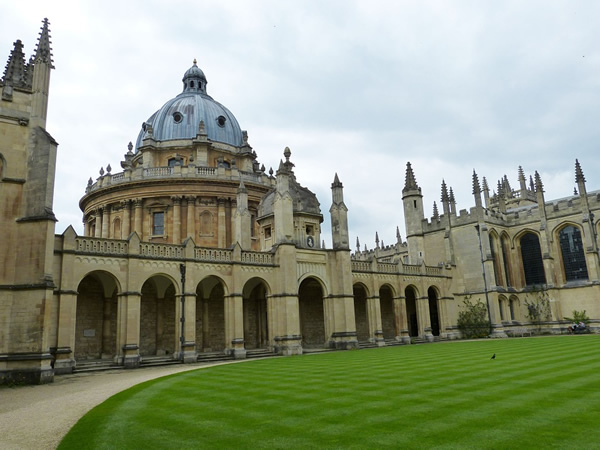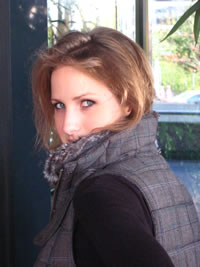Learning Abroad is Endless
An Inside View into a Study Abroad Life Journey
by Olivia Victoria Andrzejczak

|
|
In life, as in academics, learning abroad is endless.
|
Cultural Integration and Personal Growth
My current washing machine, when powered off, wobbles unsteadily on three nubby legs. When washing, it undoubtedly registers on the Richter scale and is migraine-provoking for my next-door, upstairs, and downstairs neighbors. My dryer — five yellowed ropes hanging above my bathtub- spacious enough for about ¼ of a normal-size adult — takes 2.5 days to finish the job. I have thrown out loaves of moldy bread three times, suspiciously sniffed (and speedily disposed of) leftovers twice, and tacked and re-tacked with imported Ukrainian putty the posters cheering the confines of my otherwise white-walled, Soviet-era apartment. I have no TV or internet, only what I now consider a lifetime laptop companion and a modest but movingly faithful teapot.
I have never been more content in my life.
Academic and Life Challenges Overseas
Moving to central Warsaw from the warm, brightly lit dorms, the ever-open libraries, and the facility-fullness of Princeton University has proven a stark and strenuous transition. It is not the first time I have been abroad for a prolonged period under the most solitary circumstances. And I am growing into myself more every day.
A Polish maxim states, “Travels shape.” The proverb is undoubtedly valid because, when abroad, one accepts tiny parts of a new culture to add to oneself. Qualities, mannerisms, or preferences collected like souvenirs become ornamental or, sometimes, fundamental additions to a given character. But traveling also makes a person infinitely more malleable, understanding, tolerant — and appreciative — of small things that, earlier, never seemed to matter at all. Level sidewalks. Stoves. Warm weather. Cool weather. Company. Solitude.
Key Takeaways from My Study Abroad Experiences
For instance, I learned to speak fluent Italian in the summer of my first year at Princeton when I took a graduate-level literature seminar at Urbino University in a tiny hilltop town in Northeast Italy. The textbooks were packets of Xerox copies, and the classrooms were just areas sectioned off in one breezy, doorless room. My best friends and conversation partners were the baristas who made life-giving espresso-based drinks for me every day. They nicknamed me “la secchiona” (nerd) as I shamelessly consumed Italian-English dictionaries and my morning pastry. There, I became a more animated conversationalist and an avid reader of Leopardi, and I learned How to Have Fun and how to extract semi-visceral sensations from ancient texts.
Then, I added French to my linguistic collection when I spent my summer in my sophomore year interning for a PR firm in Paris. My apartment resembled a life-size shoebox: one long room fit a bed and couch (a foldable futon), a kitchen (a hotplate and extendable wooden plank), a wardrobe (two shelves and some wire hangers), and a bathroom (an unruly showerhead and a hopelessly talkative insomniac of a toilet). My ability to speak fluently was not the result of exchanges with my stubbornly good-looking co-workers but with a reggae and poker-loving posse of recent HEC graduates. Of course, it was also that of devouring French-English dictionaries in sunlit public parks during lunchtime.
At Oxford, where I took a semester abroad my junior year, I heeded the word SILENCE — a single admonition etched in menacing black letters on almost every library wall — with complete deference. I drank port while lounging on a couch discussing Nietzschean philosophy with one tutor; I trembled on the edge of a hard green chair as I defended my thoughts on Diderot in front of another. I grew to loathe starchy tubers — boiled, fried, mashed, sautéed, marinated, roasted, or baked — as they were compulsory for sustenance in England. Once back at Princeton, I went briefly through an annoying phase of handing in essays using British spelling. Yet, once I broke that habit, only good ones remained: I was newly self-motivated and less afraid to be more analytical than original in my writing.
Princeton was crucial in allowing me to secure all of these opportunities. As soon as I expressed an interest in going somewhere — anywhere, I was guided almost exclusively by an imprecise wanderlust — its Study Abroad Office placed many options before me. The office’s counselors assured me that it made no sense to worry about requirements or grade transfers — I would never regret going abroad, they said. They were right. I graduated, having obtained academic credit for some programs and none for others, but the contents of my transcript have long ceased to be the gravitational hub of my existence.
Any regrets I have associated with going abroad have only to do with not making the most of every minute of my time. The nagging feeling that “I should have met more people,” “I should have been to more museums,” or “I should have studied less, played more,” seems unavoidable. For me, they only went away when I vowed to return someday to my favorite places. I have. I made the 14-hour trip back to Urbino via taxi, plane, train, and bus while in France. I stopped back in Paris at the end of my semester in Oxford. Although Oxford itself is still on my list, I have just returned from taking the LSATs in London — where I successfully reaffirmed my distaste for potatoes.
The Power and Pleasure of Living and Learning on My Own
Without a doubt, my life was most profoundly altered when I lived it alone, usually for months at a time, in unknown places. Voiceless teachers, like household appliances, foreign keyboards, bus schedules, or minor natural disasters, imparted some of my most meaningful and lasting lessons. Indeed, it never seems to strike one soon enough, when abroad, that in addition to studying, working, researching, or otherwise exploring, it is necessary to remember — or learn for the first time — to survive. When my parents arrived as first-generation immigrants to the United States, the primary reason they ever attempted to speak English to their next-door neighbors was a domestic crisis — a cracked, frozen-over water pipe complicating things in their basement.
I would not give my washing machine that satisfaction. Later tonight, my odd but entertaining octogenarian neighbors are coming over to regale me with stories of the Old Times.

|
Olivia Victoria Andrzejczak graduated cum laude from Princeton University’s Woodrow Wilson School of Public and International Affairs, obtaining Certificates in French, Italian, Contemporary European Politics and Society, and European Cultural Studies. Olivia is currently in Warsaw as a Fulbright Scholar, carrying out independent research projects on Chechen asylum seekers, contemporary Russo-Polish relations, and Polish migration control policies at Warsaw University’s Center for Migration Research. She speaks fluent Polish, French, and Italian and is now studying Russian and German.
|
|
